We are delighted to announce Professor Miao Hong (Shanghai Institute of Organic Chemistry, Chinese Academy of Sciences) as the recipient of the 2023 Polymer Chemistry lectureship.
This award, now in its ninth year, honours an early-career researcher who has made significant contribution to the polymer field. The recipient is selected by the Polymer Chemistry Editorial Board from a list of candidates nominated by the community.
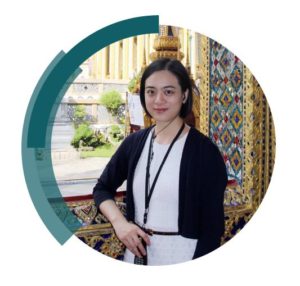 |
‘What impressed me most about Polymer Chemistry is that the manuscripts are being professionally handled with high efficiency.’
|
Miao Hong received her Ph.D. degree in 2013 under the supervision of Professor Yuesheng Li from the Changchun Institute of Applied Chemistry, Chinese Academy of Sciences. After a four-year postdoctoral stint at Colorado State University with Professor Eugene Y.-X. Chen, she joined Shanghai Institute of Organic Chemistry, Chinese Academy of Sciences in 2017 as a Full Professor of Chemistry. Research in the Hong group is centred on polymer science, catalytic chemistry, green and sustainable chemistry, and with one of the main interests being the development of novel catalysts and new methodologies for the production of sustainable polymers with controlled structures from renewable feedstocks.
To learn more about Professor Hong’s research, have a look at her most recent publication in Polymer Chemistry ‘Insights into the interaction between bis(aryloxide)alkylaluminium and N-heterocyclic carbene: from an abnormal Lewis adduct to a frustrated Lewis pair for efficient polymerizations of biomass-derived acrylic monomers‘
This is free to access until 30th September 2023, and featured in our most recent Pioneering Investigators collection. You can also check out articles from our previous lectureship winners in our lectureship winners collection.
Read our interview with Professor Hong below:
How has your research evolved from your first article to you most recent article?
The research in my group is centered on the development of novel catalysts and new methodologies for the production of sustainable polymers with controlled structures from renewable feedstocks. One of major challenges encountered in this area is the conventional catalytic systems, which can effectively polymerize petrochemical monomers, are generally inert/sluggish or uncontrolled toward the polymerization of biomass-derived monomers due to their unique heteroatom-rich structure natures. Take β-angelica lactone as an example, a key downstream chemical of levulinic acid which is available in a total yield of more than 80% from cellulose and classified as one of top biomass-derived compounds best suited to replace petroleum-derived chemicals. However, its polymerization is inaccessible by traditional polymerization methods, such as group transfer, coordination-addition, and radical polymerizations.
The first “real” article in my group, accomplished by my first Ph.D. student, is the achievement of the first polymerization of β-angelica lactone through developing a new cooperative Lewis pair catalyst. Accordingly, a heat- and solvent-resistant acrylic bioplastic is effectively synthesized. This work was published in Angew. Chem. Int. Ed. (2020, 59, 2664) and designed as a Hot Paper. On the basis of this work, we further optimized the catalyst structure and established a new and stable Frustrated Lewis pair in our very recently work (Polym. Chem. 2023, 14, 3286 – 3293), which is not only efficient for β-angelica lactone polymerization, but also can mediate fast and controlled polymerizations of methyl crotonate and (E,E)-methyl sorbate, thus establishing a general catalyst for the polymerizations of inert biomass-derived acrylic monomers. Overall, the striking findings from our group and the other groups (e.g. Chen, Zhang, Takasu) shed light on the great potential of cooperative Lewis pair catalysts for efficient polymerizations of challenging biomass-derived monomers.
What excites you most about your area of research and what has been the most exciting moment of your career so far?
The most exciting moment of my research career so far should be the successful chemical synthesis of high-molecular-weight biomaterial poly(4-hydroxybutyrate) for the first time via ring-opening polymerization (ROP) of γ-butyrolactone (Nat. Chem. 2016, 8, 42), a biomass-derived lactone monomer commonly referred as “non-polymerizable” in the textbooks and literatures due to low ring strain energy, when I was a Postdoc in Prof. Eugene Y.-X. Chen’ group at Colorado State University. However, such ROP requires extremely low reaction temperature, which severely hampers the possibly industrial applicability of the resultant polymer.
Recently, my group established a new polymerization strategy, termed isomerization-driven ROP (iROP). Different from conventionally ring strain-driven ROP, such polymerization is thermodynamically driven by S/O isomerization, thus rendering non-strained five-membered rings highly polymerizable for the first time at industrially relevant temperature of 80-100 °C. I am quite excited about iROP, because it is a simple and powerful strategy which not only can circumvent the unfavorable thermodynamics of ROPs of ‘non-stained’ five-membered lactones, and also presents a fascinating opportunity to convert these abundant, but underexploited renewable feedstocks (e.g. γ-butyrolactone, γ-valerolactone, peach lactone, dihydrojasmone lactone, whiskey lactone) into new sustainable polymers with their key physical properties comparing well to representative commodity polyolefin plastics (Nat. Chem. 2022, 14, 294; Angew. Chem. Int. Ed. 2023, 62, e202217812).
In your opinion, what are the most important questions to be asked/answered in your field of research?
One of the most important questions in the field of sustainable polymers should be how to reshape the current petroleum-based polymer industry with sustainable polymers. That is how to bring the beautiful synthetic schemes and intriguing physical properties of sustainable polymers developed in academia into industrial processes and cost-effective polymeric products. To address this question, cross-disciplinary research (such as polymer chemistry, physics, processing, engineering, and even information technology and artificial intelligence) is highly desirable, and the collaboration between both polymer industry and academic researchers is also essential.
How do you feel about Polymer Chemistry as a place to publish research on this topic?
What impressed me most about Polymer Chemistry is that the manuscripts are being professionally handled with high efficiency. Take our recent research article published by Polymer Chemistry as an example. The manuscript was submitted on 17th May 2023, the peer review of which only took two weeks, and accepted fast on13th June 2023.
In which upcoming conferences or events (online or in person) may our readers meet you?
The conferences on my schedule are the National Polymer Academic Paper Conference (Oct. 13-17, 2023, Wuhan, China) and IUPAC MACRO 2024 (July 1-4, 2024, Warwick University, United Kingdom).
Can you share one piece of career-related advice or wisdom with early career scientists?
You always can find ideas/answers in the literatures when you face the scientific questions.
How do you spend your spare time?
Try my best to accompany my family in my spare time. I always feel frustrated to balance work and life.
We would like to thank everybody who nominated a candidate for the 2023 Polymer Chemistry Lectureship. The Editorial Board had a very difficult task in choosing a winner from the many excellent and worthy candidates.
Please join us in congratulating Professor Hong on winning this award!
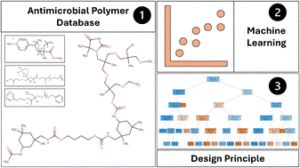













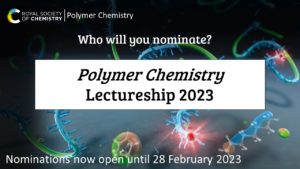
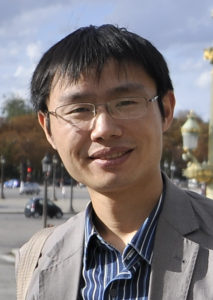 Saihu Liao studied chemistry at Huazhong University of Science and Technology, and obtained his bachelor degree in 2005. After two years of graduate study with Prof. Yuefa Gong at the same university, he joined Prof. Benjamin List’s group at the Max-Planck-Institute for Coal Research (MPI-KOFO), Germany, where he obtained his doctoral degree in organic chemistry in 2011. Then, he returned to China and joined Prof. Yong Tang’s group as a research associate at the Shanghai Institute of Organic Chemistry (SIOC), Chinese Academy of Sciences. In September 2016, he started his independent career at Fuzhou University, where he was promoted to full professor in 2017. His current research focuses on the development of new organocatalysts and new strategies for polymerization, with a special concern to photo-control and tacticity-regulation.
Saihu Liao studied chemistry at Huazhong University of Science and Technology, and obtained his bachelor degree in 2005. After two years of graduate study with Prof. Yuefa Gong at the same university, he joined Prof. Benjamin List’s group at the Max-Planck-Institute for Coal Research (MPI-KOFO), Germany, where he obtained his doctoral degree in organic chemistry in 2011. Then, he returned to China and joined Prof. Yong Tang’s group as a research associate at the Shanghai Institute of Organic Chemistry (SIOC), Chinese Academy of Sciences. In September 2016, he started his independent career at Fuzhou University, where he was promoted to full professor in 2017. His current research focuses on the development of new organocatalysts and new strategies for polymerization, with a special concern to photo-control and tacticity-regulation.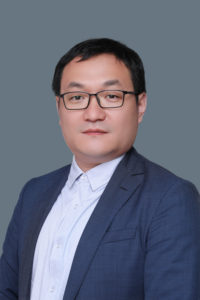 Shaofeng Liu is a professor at College of Polymer Science and Engineering at Qingdao University of Science and Technology. He received his B.S. in 2005 from Central South University, obtained his Ph.D. in 2011 from Institute of Chemistry Chinese Academy of Sciences (ICCAS) and Université de Strasbourg (UDS) under the supervision of Prof. Wen-Hua Sun and Prof. Pierre Braunstein. He then joined the group of Prof. Tobin J. Marks at Northwestern University as a postdoctoral fellow (2011-2014). In 2015, he moved to Qingdao University of Science and Technology and started his independent research career. His current research interests include organometallic catalysts for olefin polymerization and organocatalysts for sustainable polymers by ring-opening polymerization.
Shaofeng Liu is a professor at College of Polymer Science and Engineering at Qingdao University of Science and Technology. He received his B.S. in 2005 from Central South University, obtained his Ph.D. in 2011 from Institute of Chemistry Chinese Academy of Sciences (ICCAS) and Université de Strasbourg (UDS) under the supervision of Prof. Wen-Hua Sun and Prof. Pierre Braunstein. He then joined the group of Prof. Tobin J. Marks at Northwestern University as a postdoctoral fellow (2011-2014). In 2015, he moved to Qingdao University of Science and Technology and started his independent research career. His current research interests include organometallic catalysts for olefin polymerization and organocatalysts for sustainable polymers by ring-opening polymerization. 
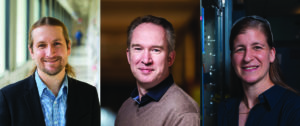

 Nick Warren is an Associate Professor at School of Chemical and Process Engineering at the University of Leeds. He was awarded an Masters in Chemistry from the University of Bristol in 2005 following which he conducted two years industrial research. He then moved to the University of Sheffield where he obtained a PhD in Polymer Chemistry. He continued as a postdoctoral researcher in Sheffield working in the area of polymerisation-induced self-assembly (PISA) until 2016, when he moved to Leeds to start his independent research career. His research group aims to design a new generation of sustainable and functional polymer materials by exploiting the latest advances in both polymer chemistry and self-optimising reactor technologies equipped with advanced online monitoring and computer control. He can be found on Twitter
Nick Warren is an Associate Professor at School of Chemical and Process Engineering at the University of Leeds. He was awarded an Masters in Chemistry from the University of Bristol in 2005 following which he conducted two years industrial research. He then moved to the University of Sheffield where he obtained a PhD in Polymer Chemistry. He continued as a postdoctoral researcher in Sheffield working in the area of polymerisation-induced self-assembly (PISA) until 2016, when he moved to Leeds to start his independent research career. His research group aims to design a new generation of sustainable and functional polymer materials by exploiting the latest advances in both polymer chemistry and self-optimising reactor technologies equipped with advanced online monitoring and computer control. He can be found on Twitter 
